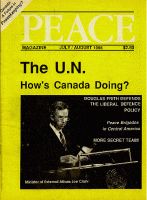
Peace Magazine Aug-Sep 1988, page 21. Some rights reserved.
Search for other articles by Patra Dounoukos here
TORONTO -- While the seven world leaders met in Toronto in June, an Alternate Economic Summit also met.
Donald Wells, of York University, spoke on economic conversion. He called for coordination beyond the local level, starting with sympathetic religious, women's, and ecological activists. For example, opposition to missile flight tests in remote areas is a key concern of both ecological and native rights groups. Coordination of local initiatives will need a series of related and carefully selected, attainable, short-term goals. p
LUND, SWEDEN -- The European Nuclear Disarmament Conference (June 29 to July 2) was a barometer of changing East/ West relations.
The END organizers had invited Soviet Peace Committee delegates on the condition that independent activists be included in the delegation. Not one such independent Soviet citizen attended. However, Bruce Allen, a Canadian who attended, describes the official Soviet policy statements as the most liberal yet.
The Peace Councils of the German Democratic Republic and Czechoslovakia boycotted the conference.
Hungarians met no restrictions on attendance. In a workshop on glasnost Allen lauded the rehabilitation of such Soviets as Bukharin. He asked when we will see the rehabilitation of Bukharin's eminent Hungarian political follower, Imré Nagy. Later a Peace Council delegate said that there will be a reassessment of Nagy in two or three years.
The picture from Poland was mixed. Only relatively unknown members of Freedom and Peace were allowed to attend. However, Janusz Onyszkiewicz, now the official spokesperson for Solidarnosc, was present.
The high point of the conference was the session on European identity, when Edward P. Thompson shared the stage with Jacek Kuron and, to thunderous applause, embraced him. Kuron recognized the intertwined nature of peace and human rights. The Poles discussed changes in the East without resentment, and responded warmly to their joyful counterparts.
The packed session on Romania revealed the severity of its economic crisis and the barbarity of the regime. Allen calls Romania a time bomb with grave implications for stability in Europe. November 15 will be an international day of solidarity with the Romanian people, and a call for the rights of the Hungarian s.
September 30 is a day of solidarity for Mordechai Vanunu. And END will meet next year in Spain. p
PRAGUE -- An international conference, "Prague '88." was called for June 17-19, under the joint sponsorship of the human rights organization Charta 77 and the Independent Peace Association. The latter is a newly-formed independent peace group of some forty (mainly young) members.
Thirty-five foreign participants came from fourteen countries. This unauthorized conference was to be held in private homes, since the organizers had been unable to reserve a public place for it.
Joanne Landy, the New York-based editor of Peace and Democracy News, reports arriving at the apartment of Charta 77 activist Jiri Dienstbier for the first of the discussions. The police had already arrested him and the other leaders. The visitors went to ask help of the Peace Council but found no one there. The Council had been invited to participate in the conference.
In the second session, Jiri Hajek, the former Foreign Minister, had given a talk by the time the police arrived.
The delegates next met in a café. This time the foreigners were taken to the police station, kept there for six hours, and expelled from the country. The event received wide press coverage. Soon afterwards, Prime Minister Lubomir Strougal, under questioning by the Austrian press, said that the police had been overly zealous. It should not happen again, he said. He did not apologize, nor did he promise that such events will not happen again. At about the same time, Ruth Sormopa, a Czech peace activist, was not allowed to the END Convention in Lund, Sweden. This brought a wave of protests.
Are there now divisions of opinion within the Czech government about such contacts? No one can be sure. p
NORFOLK, VA-- Four members of Nuclear Navy Ploughshares were convicted for criminal trespassing, after an action in which Phil Berrigan, Greg Boertje, Andrew Lawrence and Sister Margaret McKenna boarded the USS Iowa and vandalized box launchers for Tomahawk Sea-Launched Cruise Missiles.
Initially charged with destruction of government property, the four now face a reduced charge of criminal trespass, a misdemeanor carrying a maximum penalty of six months in jail and a $500 fine. The reduction of charges serves two purposes: misdemeanors don't require trial by jury, ensuring a guilty verdict from the bench; and the relatively light maximum sentence is less likely to evoke sympathy for the defendants or outrage towards the court.
The defendants, who represented themselves, readily admitted their actions. They cited the Constitution, The Nuremburg Principles, God's law, international law, and the U.N. Charter, saying they had no criminal intent, but were just affirming those laws. p

Peace Magazine Aug-Sep 1988, page 21. Some rights reserved.
Search for other articles by Patra Dounoukos here